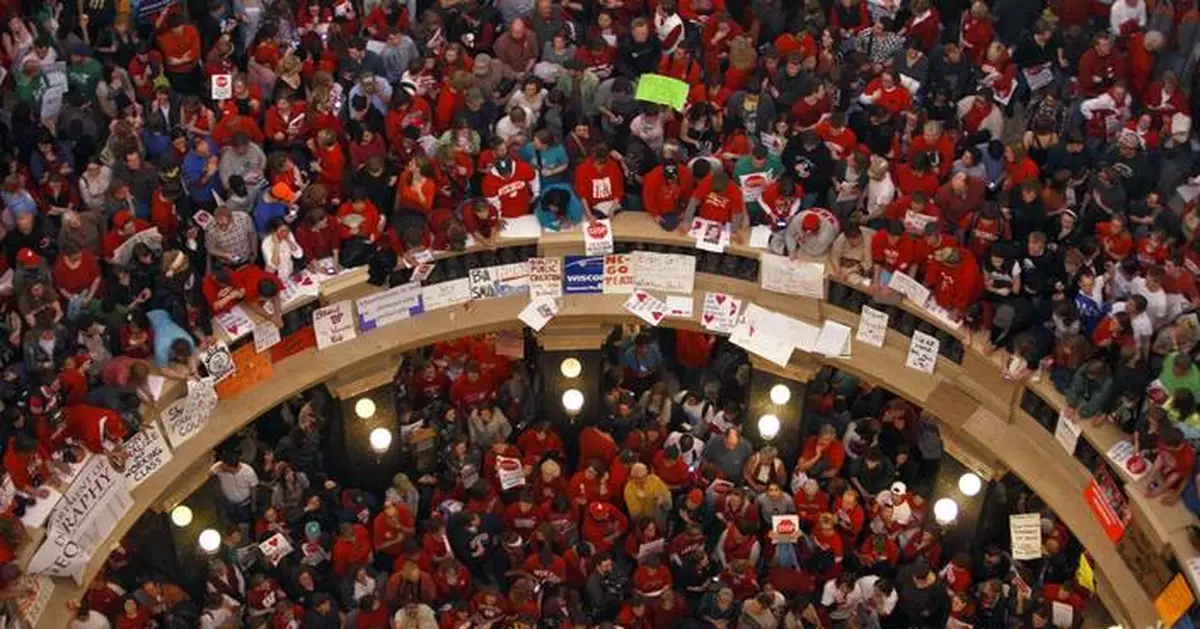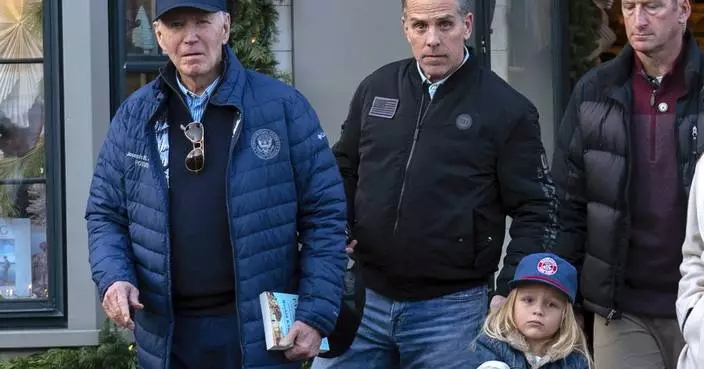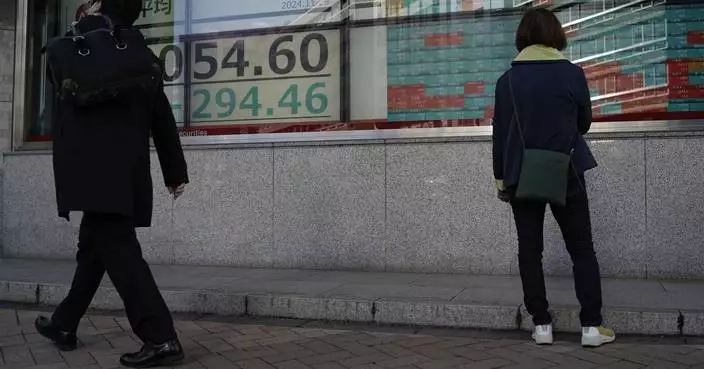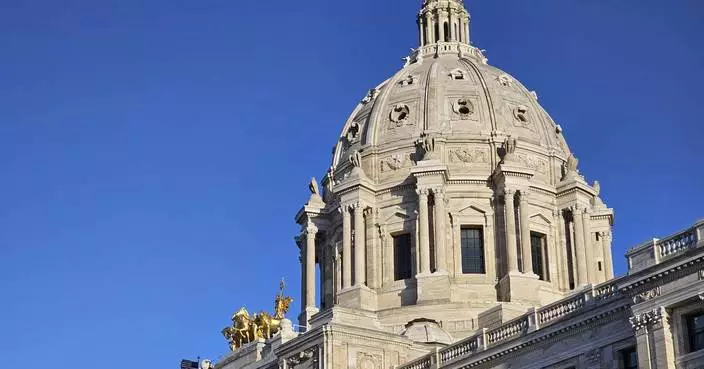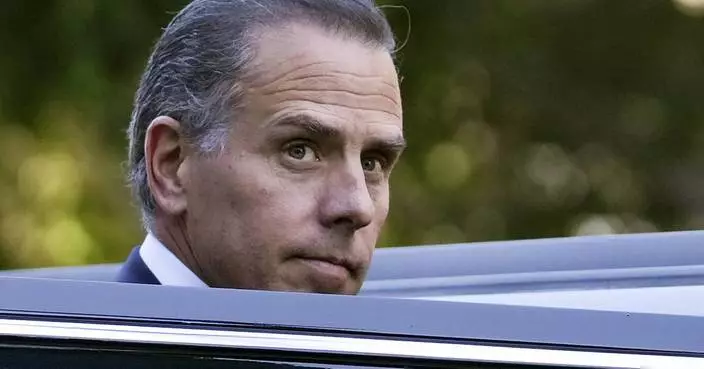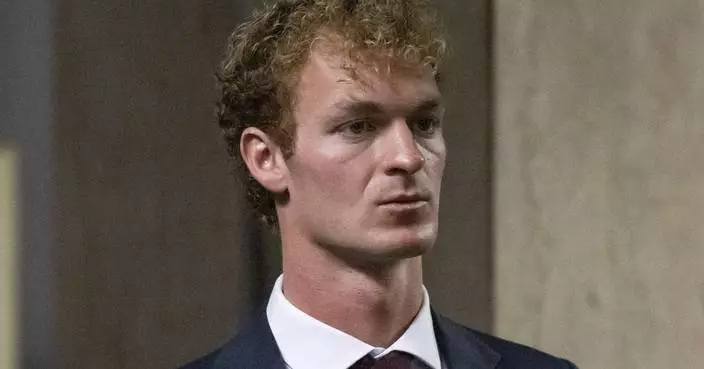MADISON, Wis. (AP) — Wisconsin public worker and teachers unions scored a major legal victory Monday with a ruling that restores collective bargaining rights they lost under a 2011 state law that sparked weeks of protests and made the state the center of the national battle over union rights.
That law, known as Act 10, effectively ended the ability of most public employees to bargain for wage increases and other issues, and forced them to pay more for health insurance and retirement benefits.
Under the ruling by Dane County Circuit Judge Jacob Frost, all public sector workers who lost their collective bargaining power would have it restored to what was in place prior to 2011. They would be treated the same as the police, firefighter and other public safety unions that were exempted under the law.
Republicans vowed to immediately appeal the ruling, which ultimately is likely to go before the Wisconsin Supreme Court. That only amplifies the importance of the April election that will determine whether the court remains controlled 4-3 by liberal justices.
Former Gov. Scott Walker, who proposed the law that catapulted him onto the national political stage, decried the ruling in a post on the social media platform X as “brazen political activism.” He said it makes the state Supreme Court election “that much more important.”
Supporters of the law have said it provided local governments more control over workers and the powers they needed to cut costs. Repealing the law, which allowed schools and local governments to raise money through higher employee contributions for benefits, would bankrupt those entities, backers of Act 10 have argued.
Democratic opponents argue that the law has hurt schools and other government agencies by taking away the ability of employees to collectively bargain for their pay and working conditions.
Union leaders were overjoyed with the ruling, which affects tens of thousands of public employees.
“We realize there may still be a fight ahead of us in the courts, but make no mistake, we’re ready to keep fighting until we all have a seat at the table again,” said Ben Gruber, a conservation warden and president of AFSCME Local 1215.
The law was proposed by Walker and enacted by the Republican-controlled Legislature in spite of massive protests that went on for weeks and drew as many as 100,000 people to the Capitol. The law has withstood numerous legal challenges over the years, but this was the first brought since the Wisconsin Supreme Court flipped to liberal control in 2023.
The seven unions and three union leaders that brought the lawsuit argued that the law should be struck down because it creates unconstitutional exemptions for firefighters and other public safety workers. Attorneys for the Legislature and state agencies countered that the exemptions are legal, have already been upheld by other courts, and that the case should be dismissed.
But Frost sided with the unions in July, saying the law violates equal protection guarantees in the Wisconsin Constitution by dividing public employees into “general” and “public safety” employees. He ruled that general employee unions, like those representing teachers, can not be treated differently from public safety unions that were exempt from the law.
His ruling Monday delineated the dozens of specific provisions in the law that must be struck.
Wisconsin Republican Assembly Speaker Robin Vos said he looked forward to appealing the ruling.
“This lawsuit came more than a decade after Act 10 became law and after many courts rejected the same meritless legal challenges,” Vos said in a statement.
Wisconsin Manufacturers and Commerce, the state's largest business lobbying organization, also decried the ruling. WMC President Kurt Bauer called Act 10 “a critical tool for policymakers and elected officials to balance budgets and find taxpayer savings."
The Legislature said in court filings that arguments made in the current case were rejected in 2014 by the state Supreme Court. The only change since that ruling is the makeup of Wisconsin Supreme Court, attorneys for the Legislature argued.
The Act 10 law effectively ended collective bargaining for most public unions by allowing them to bargain solely over base wage increases no greater than inflation. It also disallowed the automatic withdrawal of union dues, required annual recertification votes for unions, and forced public workers to pay more for health insurance and retirement benefits.
The law was the signature legislative achievement of Walker, who was targeted for a recall election he won. Walker used his fights with unions to mount an unsuccessful presidential run in 2016.
Frost, the judge who issued Monday's ruling, appeared to have signed the petition to recall Walker from office. None of the attorneys sought his removal from the case and he did not step down. Frost was appointed to the bench by Democratic Gov. Tony Evers, who signed the Walker recall petition.
The law has also led to a dramatic decrease in union membership across the state. The nonpartisan Wisconsin Policy Forum said in a 2022 analysis that since 2000, Wisconsin had the largest decline in the proportion of its workforce that is unionized.
In 2015, the GOP-controlled Wisconsin Legislature approved a right-to-work law that limited the power of private-sector unions.
Public sector unions that brought the lawsuit are the Abbotsford Education Association; the American Federation of State, County and Municipal Employees Locals 47 and 1215; the Beaver Dam Education Association; SEIU Wisconsin; the Teaching Assistants’ Association Local 3220 and the International Brotherhood of Teamsters Local 695.
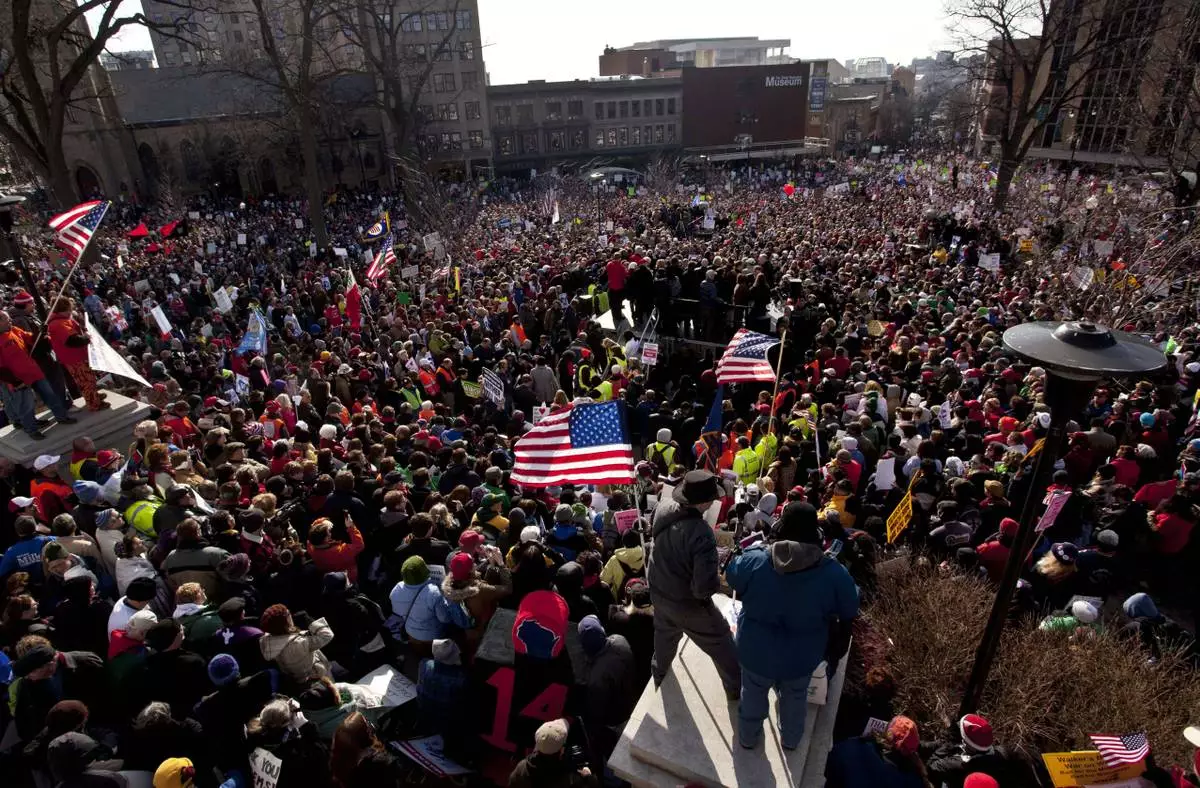
FILE - In this March 12, 2011, photo, thousands of pro-labor protesters rallied at the Wisconsin Capitol in Madison, Wis. (AP Photo/Morry Gash, File)
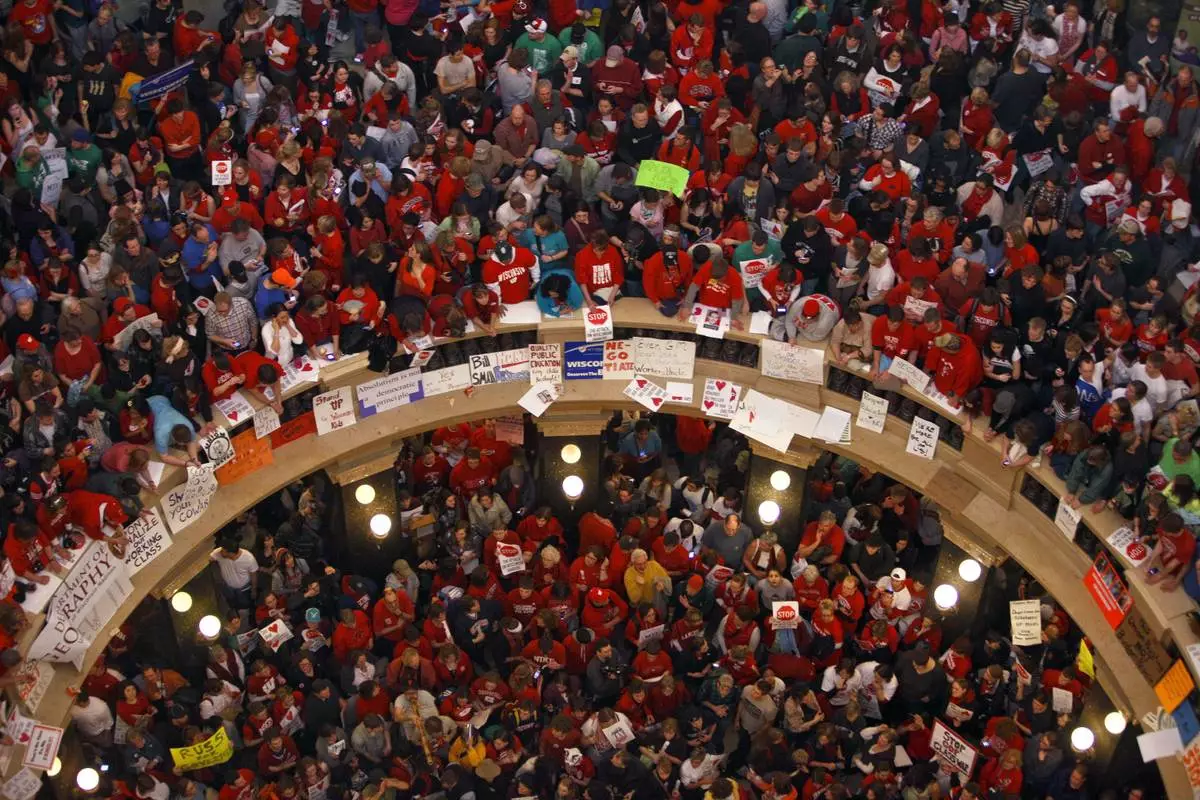
FILE - This file photo taken Feb. 17, 2011 shows protestors of Wisconsin Gov. Scott Walker's bill to eliminate collective bargaining rights for many state workers packing the rotunda at the State Capitol in Madison, Wis. (AP Photo/Andy Manis, File)
Some storm-weary residents of the Great Lakes region saw additional snow Monday and faced the prospect of even more accumulations this week after U.S. travelers battled harsh weather to get home after Thanksgiving, forecasters said.
Lake-effect snow continued to fall on parts of western New York that were already blanketed with a foot or more over the past four days. By Monday morning, the village of Cassadaga, east of Lake Erie, recorded 5.5 feet (1.7 meters) of snow. And snow was expected to continue through Tuesday in the largely rural area south of Buffalo.
"We’re expecting about another foot, but some locations will likely pick up a little bit more than that,” said meteorologist Phillip Pandolfo.
Lake-effect snow warnings were in effect through Tuesday night in parts of Ohio, New York and Pennsylvania.
Nearly 4 feet (1.2 meters) of lake-effect snow — caused by warm, moist air blowing across the Great Lakes — fell over the weekend on upstate New York and parts of Pennsylvania and Michigan.
Snow showers fell in western Michigan overnight, and heavier, persistent snow of up to a foot (30 centimeters) was expected to follow Monday, the National Weather Service said. More snow is expected Wednesday and Thursday, along with gusty winds and freezing temperatures.
Skies were clear east of Lake Ontario in northern New York, where some residents were still digging out from mountains of snow.
“We’ve got snow banks that are higher than me — that’s pushing probably 8 to 10 feet high,” said Mary Shambo, owner of the Cottage Inn in Copenhagen, New York. The small village received just under six feet (1.8 meters) of snow in four days.
Shambo and her husband, Ben, managed to stay open through the thick of the storm this weekend. Some locals arrived by snowmobile, but they mostly served truckers who pulled off the road when bands of snow became particularly fierce.
“It goes from whiteout conditions to clear,” she said, “so they would take off when it was clear and hope to God they got to where they needed to go.”
In Ohio, the mayor of Geneva-on-the-Lake has been using a backhoe almost nonstop since Thursday to clear more than four feet of snow that socked the quaint village siting along Lake Erie east of Cleveland.
“It was just relentless. We’d plow and a couple hours later it’d be back again,” said Mayor Dwayne Bennett. “Every business down here has been shut down the last four days. You can’t even get in the front doors.”
“The problem is we’re not equipped to handle this much snow in this amount of time,” he said.
Flinty fans scoffed at the flurries and numbing temperatures during Sunday’s nighttime NFL game in Buffalo, New York, against the San Francisco 49ers.
The NFL’s Bills said the organization would pay $20 per hour and provide food and hot drinks to snow shovelers.
The lake-effect storm began hitting the area Saturday near the Bills’ stadium in Orchard Park, New York. Though the storm shifted south of the stadium by noon Sunday, snow continued to fall off and on through the day. Flurries began to fall more heavily just before kickoff. The game was played in chilly conditions, with the temperature at 27 degrees (minus 3 Celsius), with the wind chill making it feel like 17 (minus 8 Celsius). The Bills often play in such conditions at home late in the season.
Tim LoTemple, a Bills season-ticket holder from Rochester, New York, and part of the team's rabid fan base known as “Bills Mafia," said the freezing temperatures and snow energize the players and fans. Still, the 49ers game was practically temperate compared to previous matchups at Highmark Stadium.
“We love snow over here. You know how Bills Mafia is, we love the cold," he said from a parking lot tailgate party. "This is nothing compared to what we’ve seen before.”
But for Jake Dyer, an Indianapolis Colts fan visiting from Southern California, a cold-weather game is a rarity.
“Only thing I didn’t prepare for was shoes. I double up on everything else, but my feet are cold,” he said. “Mad respect for anybody who comes out. Anybody can sit at home, comfy in their chair to watch this game.”
Up to 17 inches (43 centimeters) of snow fell in Alaska’s capital city of Juneau over the weekend as part of a system that was “definitely stronger” than what the region typically experiences this time of year, said National Weather Service meteorologist Greg Spann.
Snow had transitioned to freezing rain early Monday, he said, with roads icy in some areas. Wet, heavy snow was piled on sidewalks along busy streets near downtown Juneau, and slushy pools were forming at some intersections. School went to remote learning in Juneau on Monday, and state offices were closed due to freezing rain. Ice encased the thin branches on some trees.
The forecast called for rain and unusually warm temperatures, in the 40s, this week.
While some other communities north of Juneau also got heavy snowfall, further south there was heavy rain. Ketchikan received 6.38 inches (about 16 centimeters) of rain over 24 hours, Spann said.
Parts of Michigan were battered by lake-effect snow as bands rolling off Lake Superior buried parts of the Upper Peninsula under 2 feet (61 centimeters) or more, said Lily Chapman, a weather service meteorologist.
Twenty-seven inches (69 centimeters) of snow fell northeast of Ironwood, in the Upper Peninsula’s western reaches. More than a foot (30.5 centimeters) could fall over the eastern Upper Peninsula through Monday morning, Chapman said Saturday.
Contributing to this report were Susan Haigh in Norwich, Connecticut; John Seewer in Toledo, Ohio; and Becky Bohrer in Juneau, Alaska
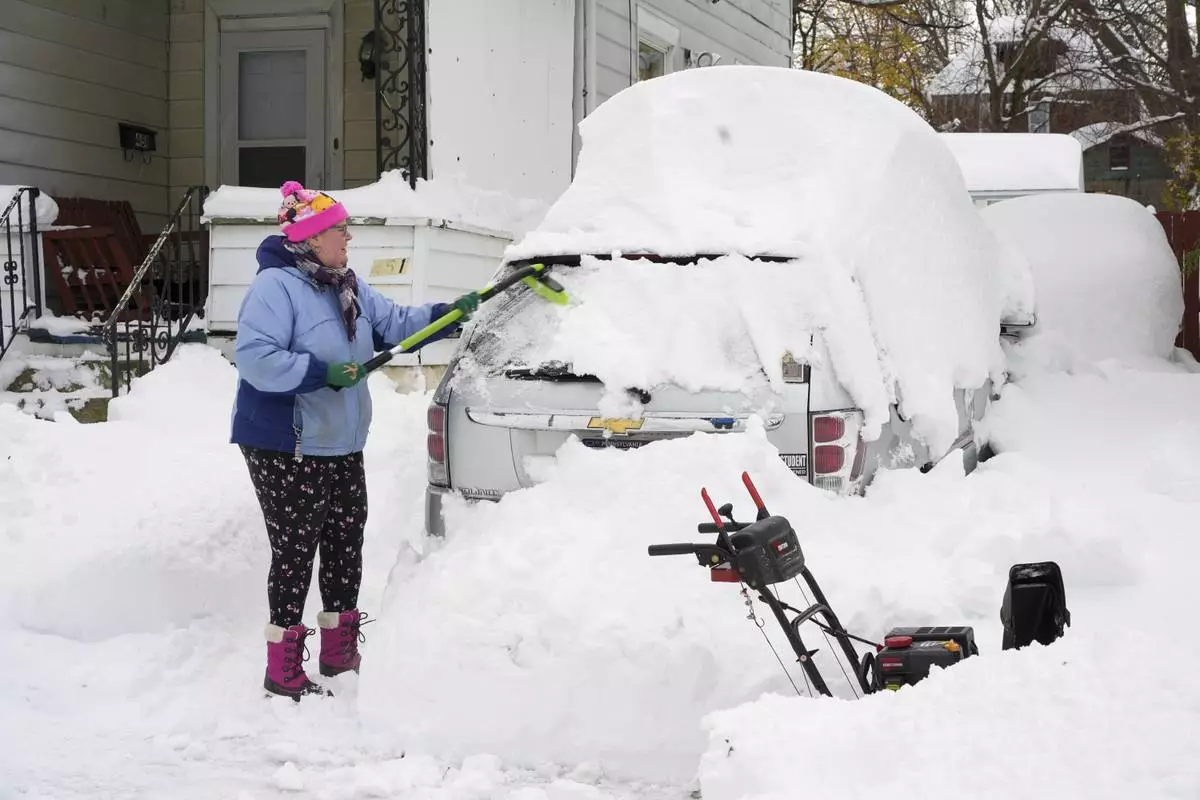
Serena Schodt brushes snow off her car in Erie, Pa., Monday, Dec 2, 2024. AP Photo/Gene J. Puskar)
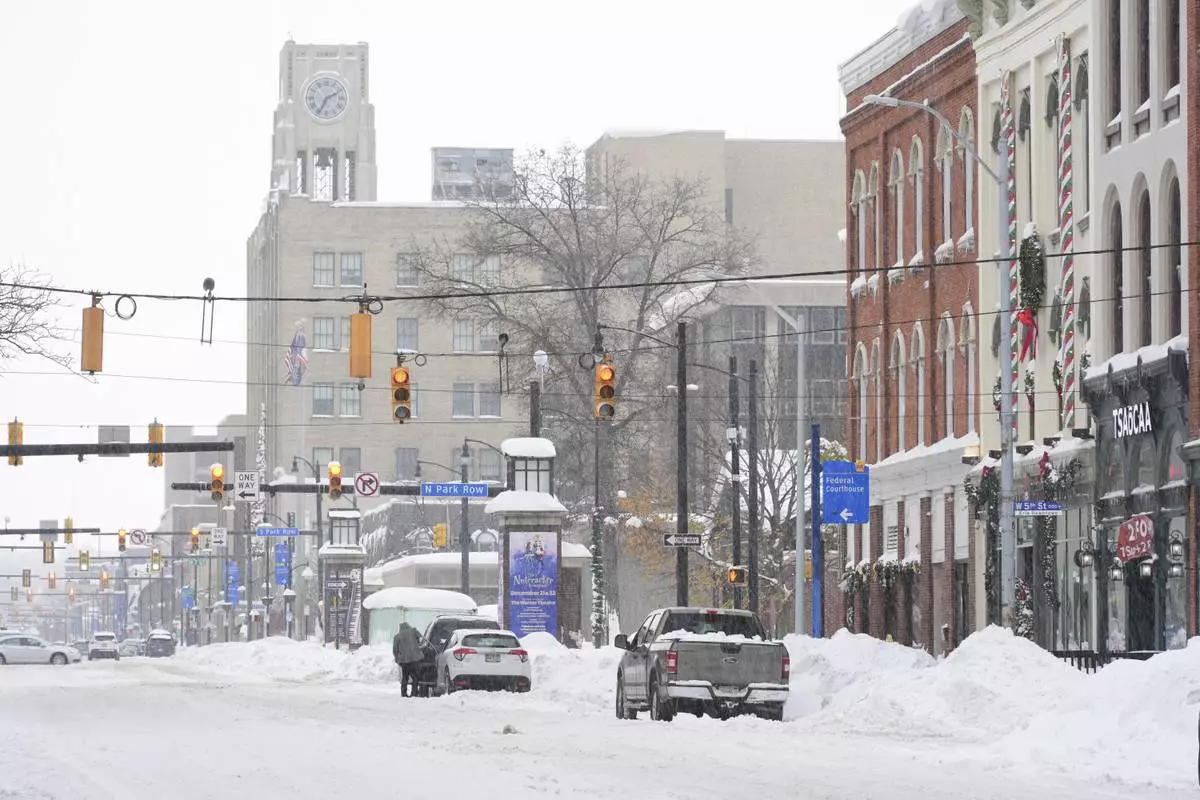
State Street, one of the main streets in downtown Erie, Pa., is covered in snow Tuesday, Nov. 5, 2024. (AP Photo/Gene J. Puskar)
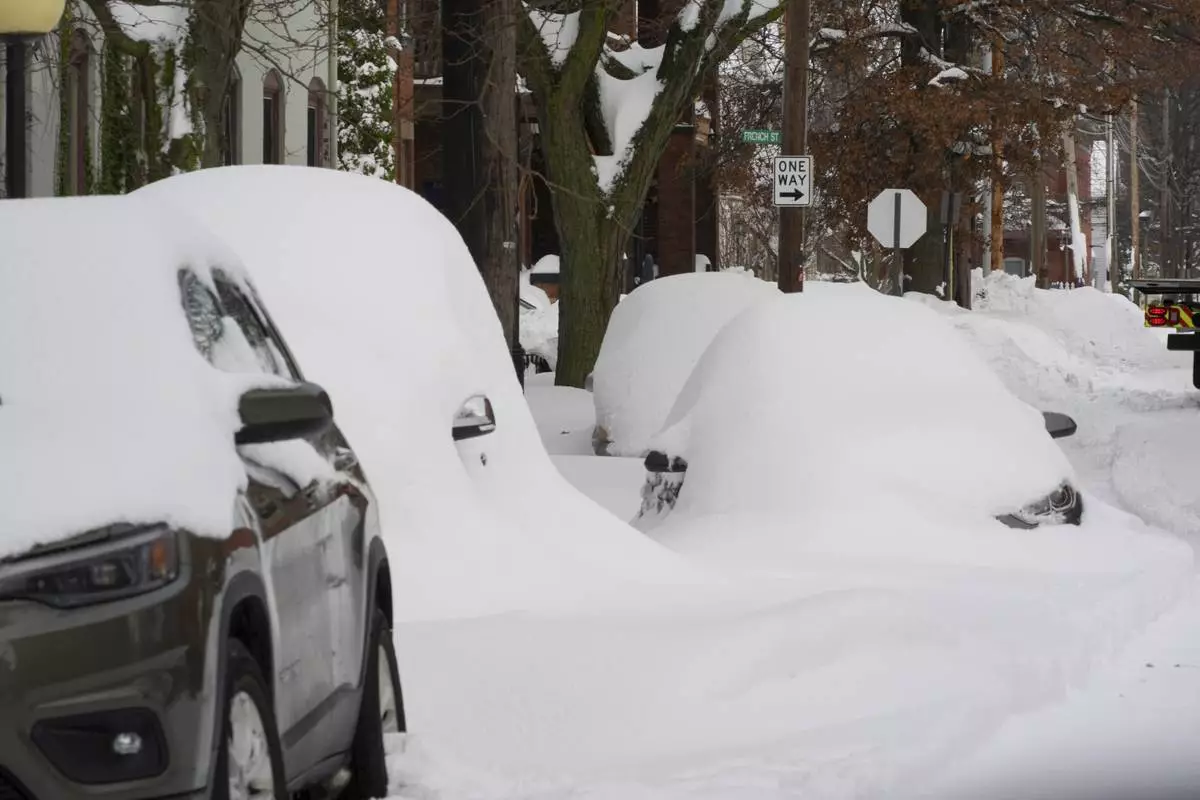
Cars are buried in snow on a side street in downtown Erie, Pa., Tuesday, Nov. 5, 2024. (AP Photo/Gene J. Puskar)
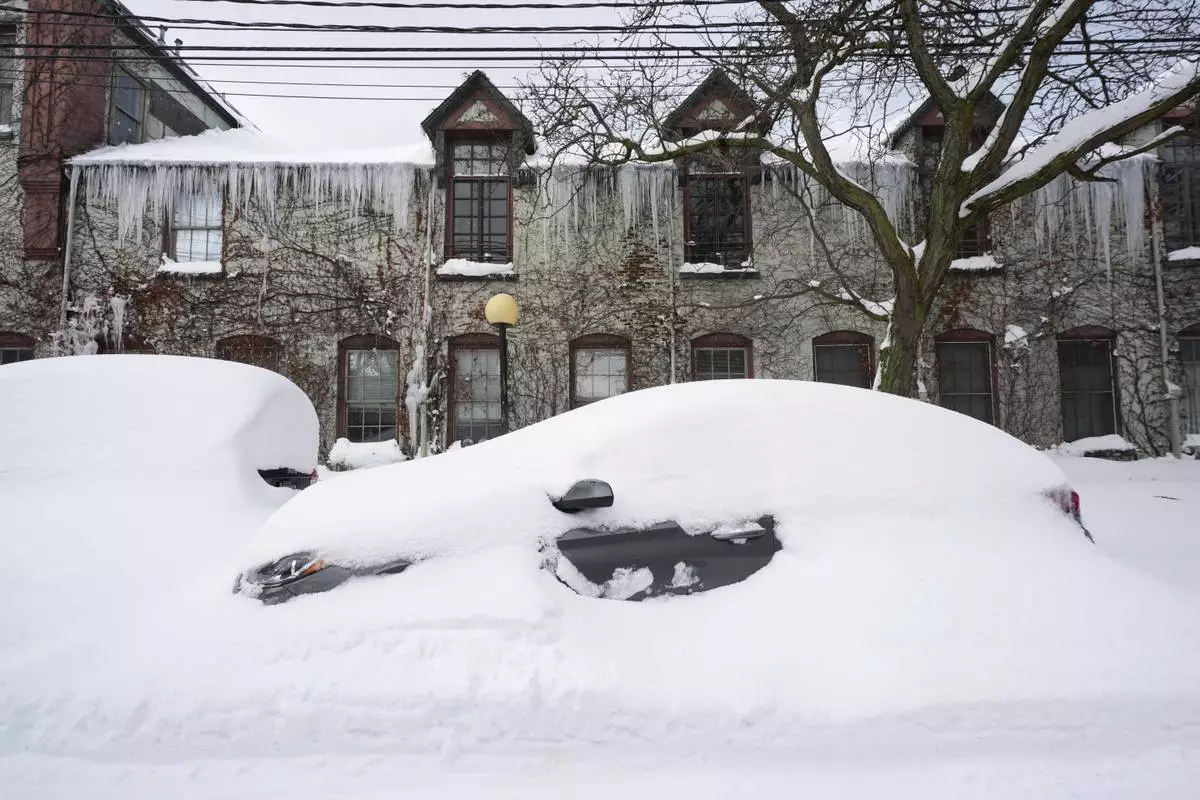
Cars are buried in snow in front of a building with icicles hang from the roof on a side street in downtown Erie, Pa., Tuesday, Nov. 5, 2024. (AP Photo/Gene J. Puskar)
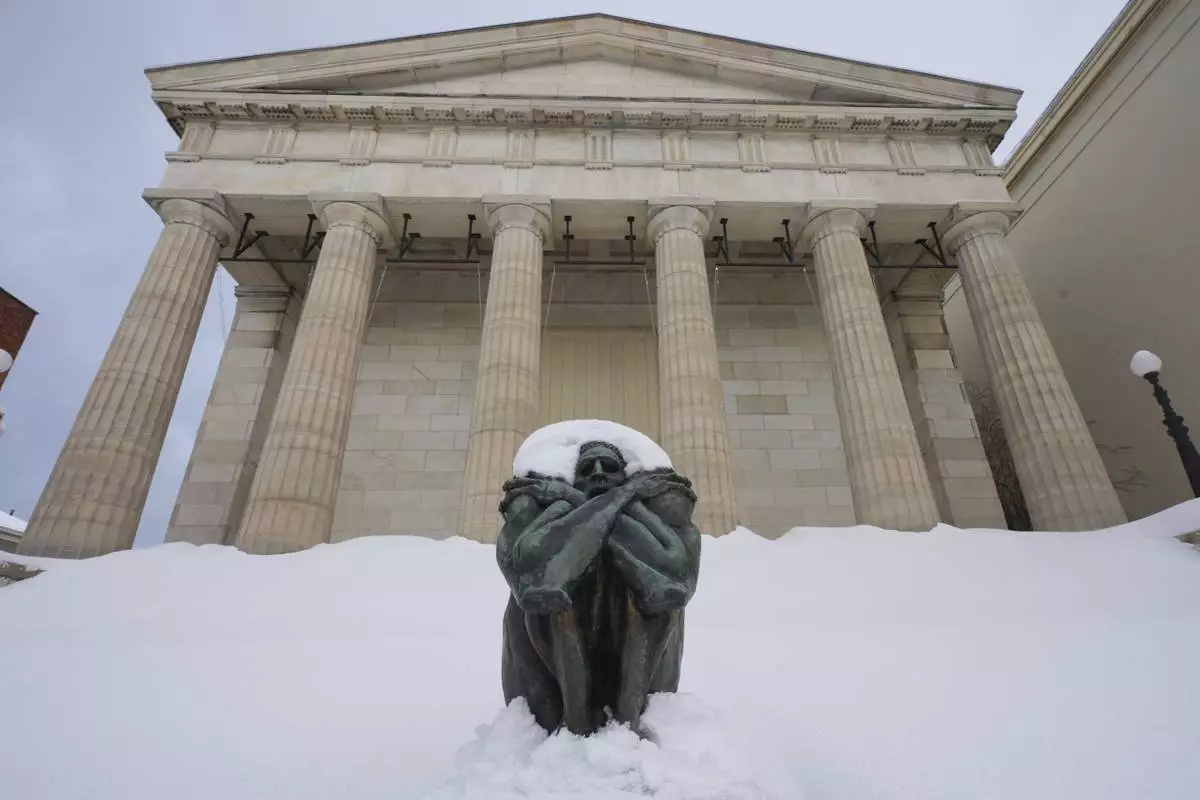
A sculpture is covered in snow on the steps of Erie Art Museum Tuesday, Nov. 5, 2024 in Erie, Pa. (AP Photo/Gene J. Puskar)
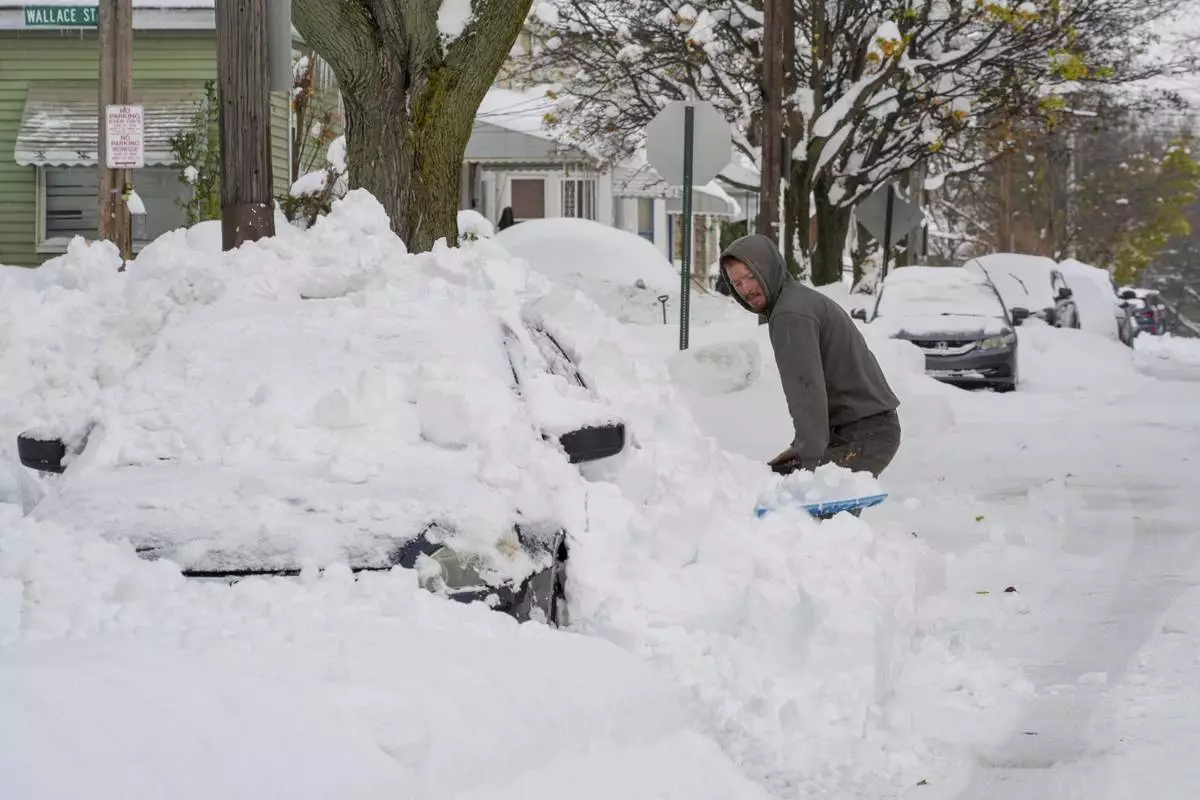
Matthew Jewell shovels snow off his father's car on a side street in Erie, Pa., Monday, Dec 2, 2024. AP Photo/Gene J. Puskar)
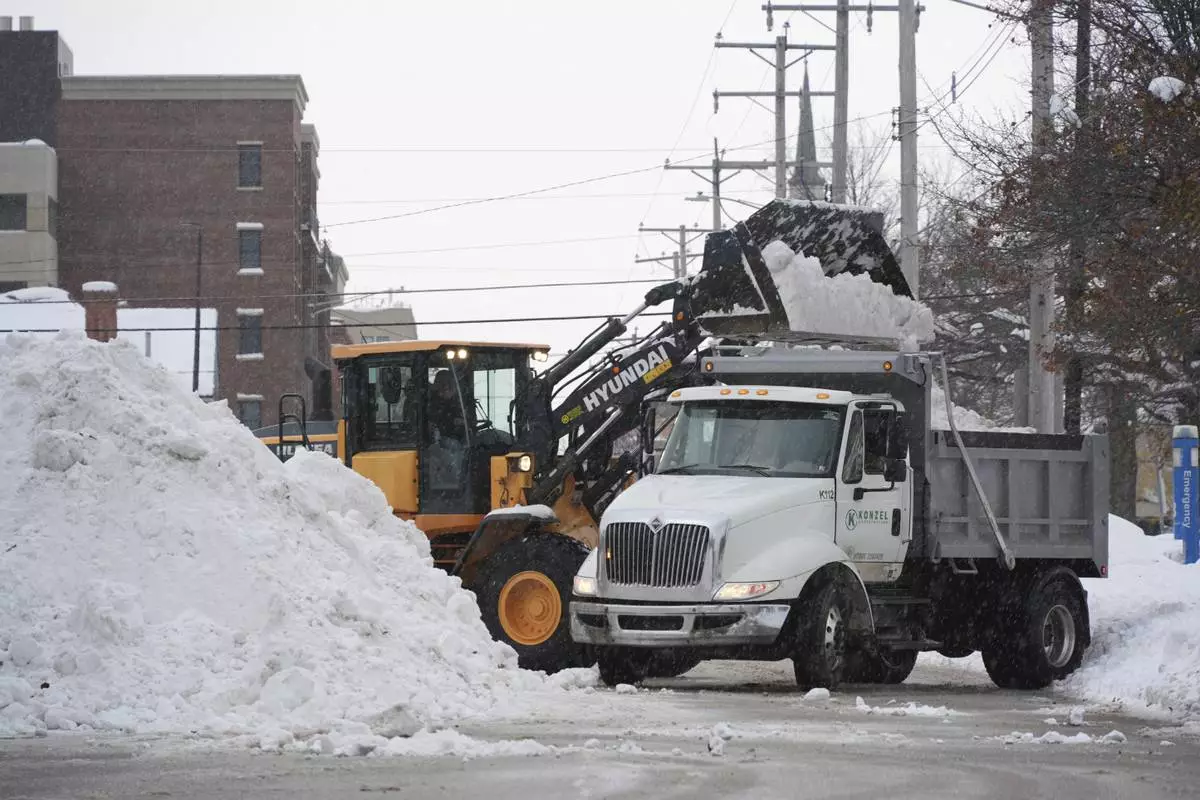
Workers clear snow on side streets Monday, Dec 2, 2024, In Erie, Pa. (AP Photo/Gene J. Puskar)
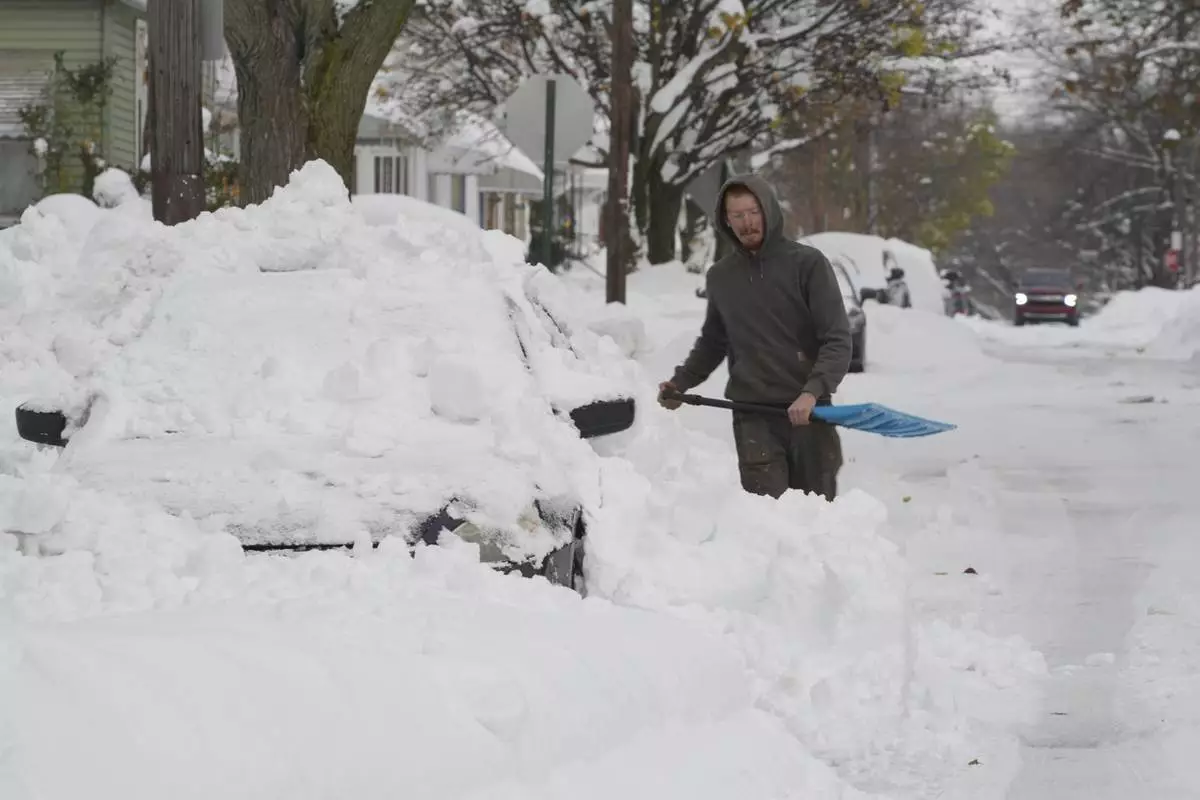
Matthew Jewell helps shovel snow off his father's car on the side street in Erie, Pa., Monday, Dec 2, 2024. AP Photo/Gene J. Puskar)
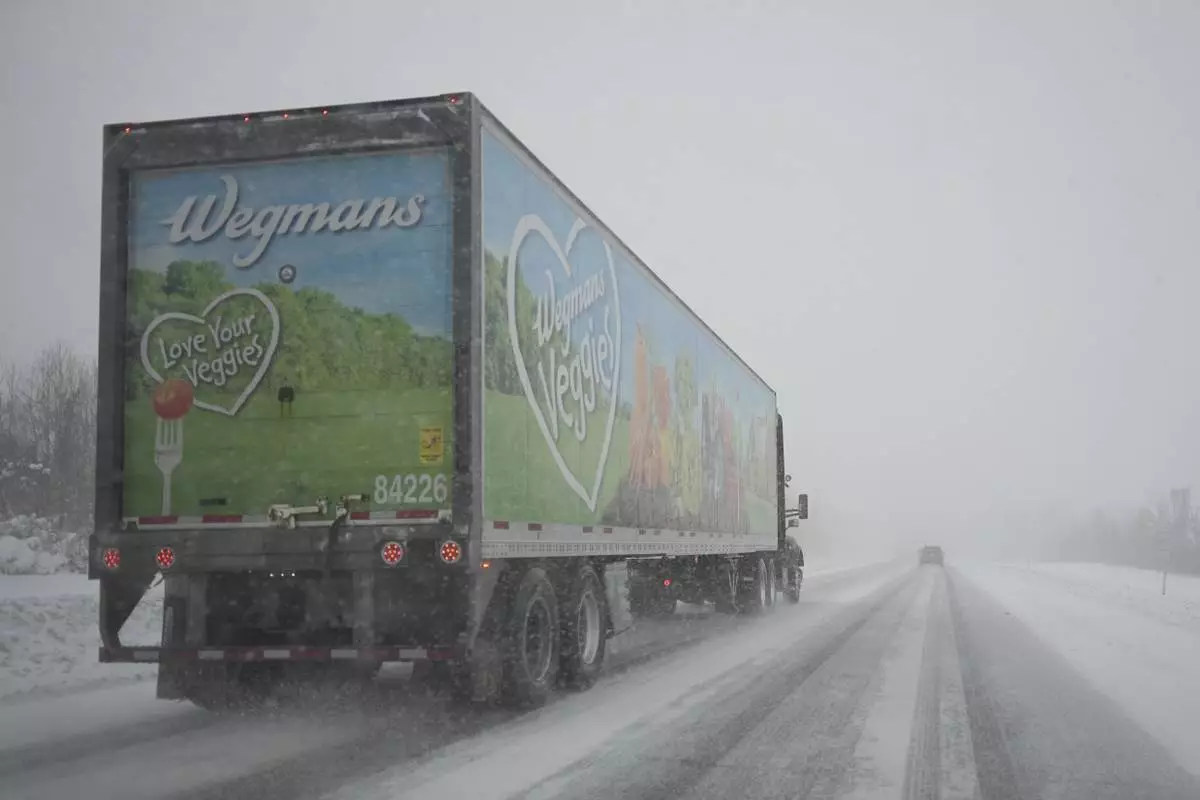
A truck travels on interstate 90 near New York-Pennsylvania border in Ripley, N.Y., Monday, Dec 2, 2024. (AP Photo/Gene J. Puskar)
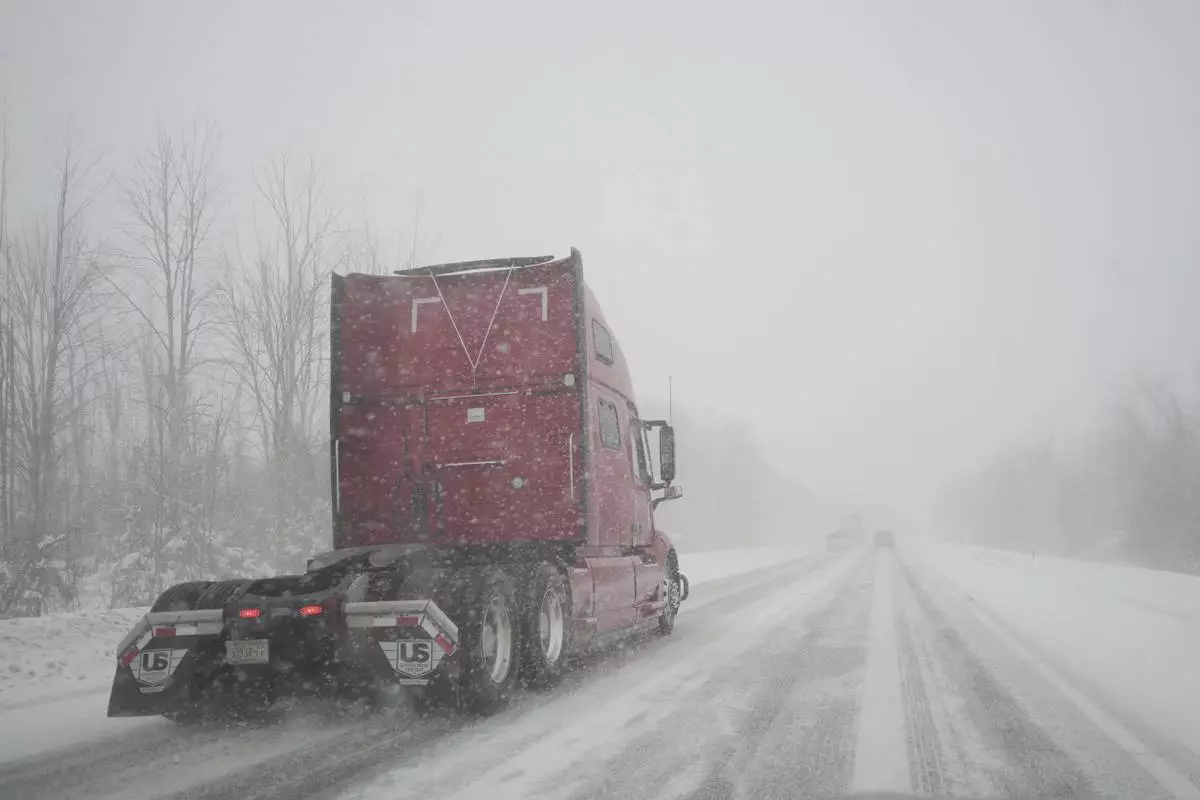
A truck travels on interstate 90 near New York-Pennsylvania border in Ripley, N.Y., Monday, Dec 2, 2024. (AP Photo/Gene J. Puskar)
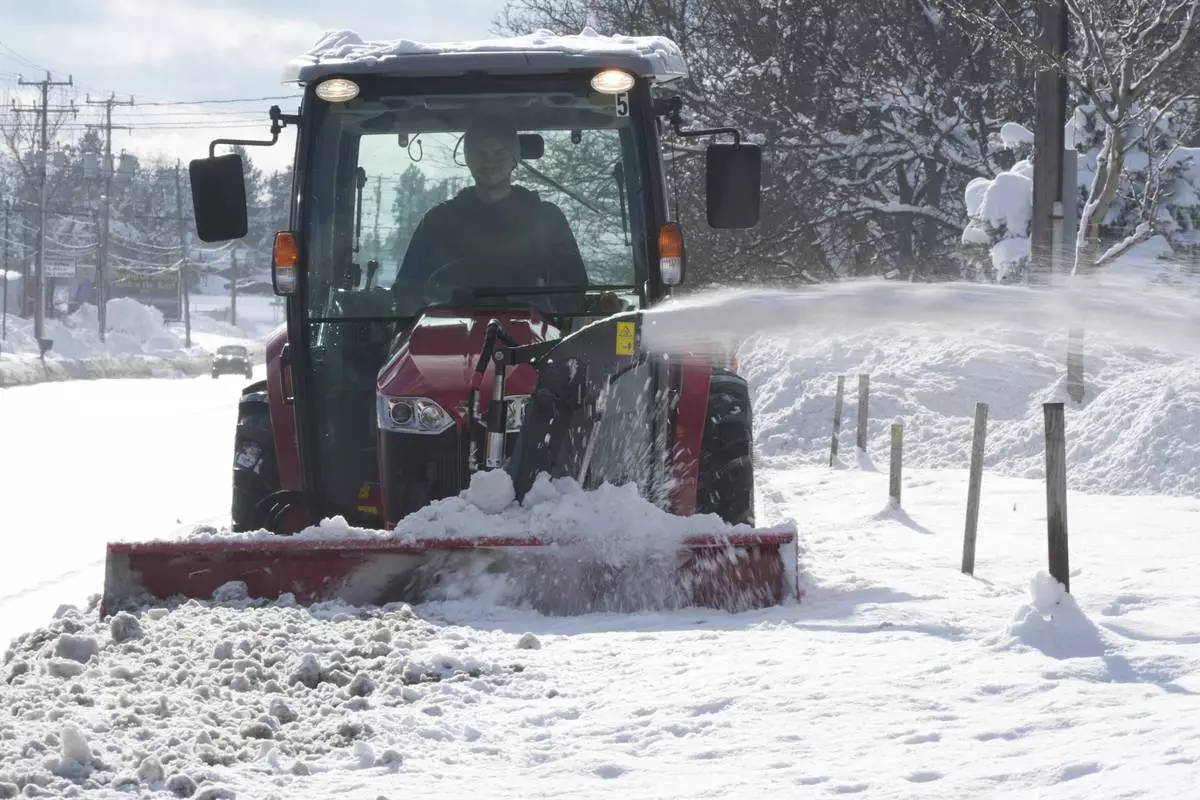
A man clears a path through the snow in Elma, N.Y., Monday, Dec. 2, 2024. (AP Photo/Gene J. Puskar)
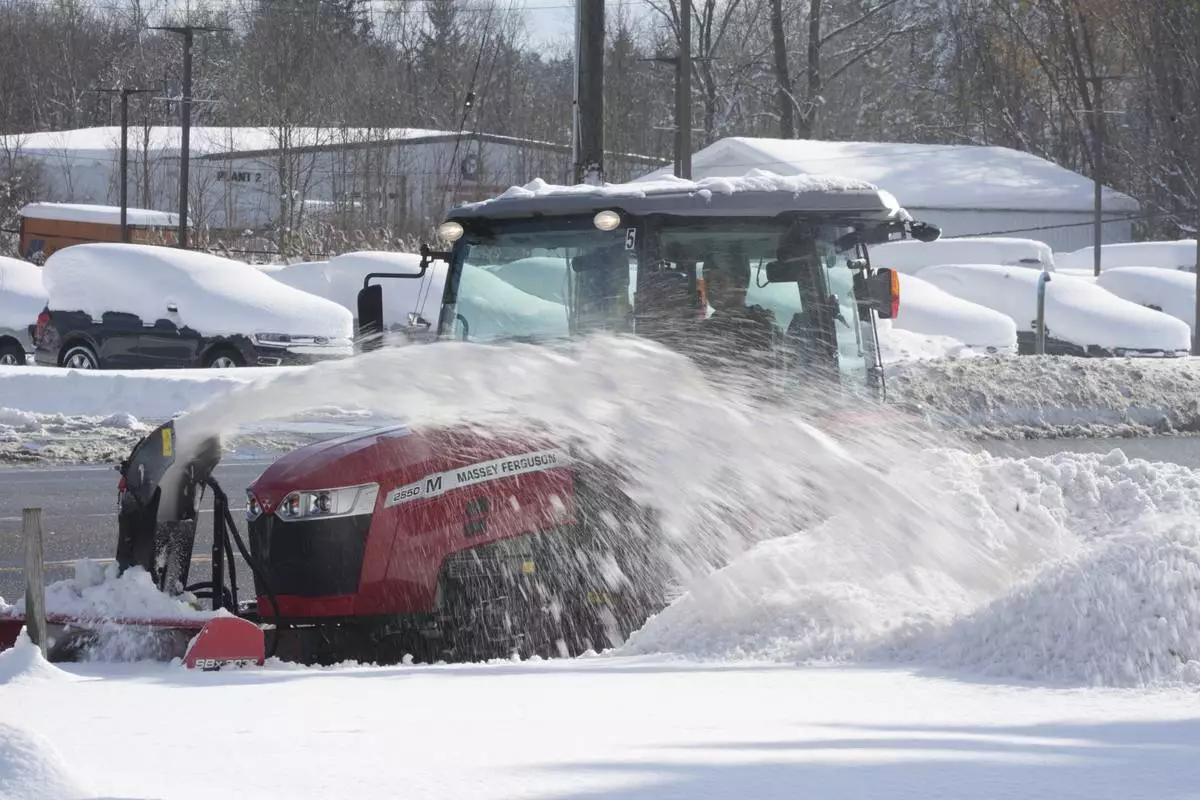
A man clears a path through the snow using a tractor in Elma, N.Y., Monday, Dec. 2, 2024. (AP Photo/Gene J. Puskar)
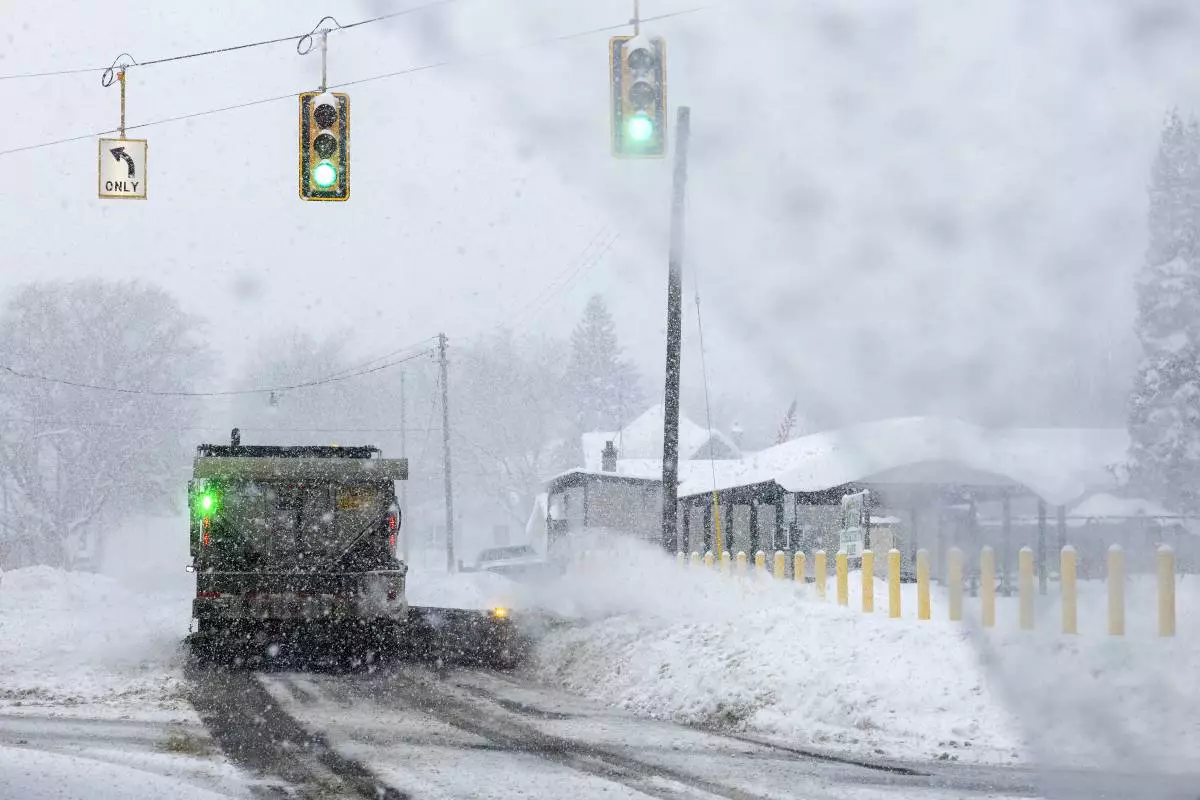
A plow removes snow from M-42 in Antrim County, Mich. on Sunday, Dec. 1, 2024. (Joel Bissell/Kalamazoo Gazette via AP)
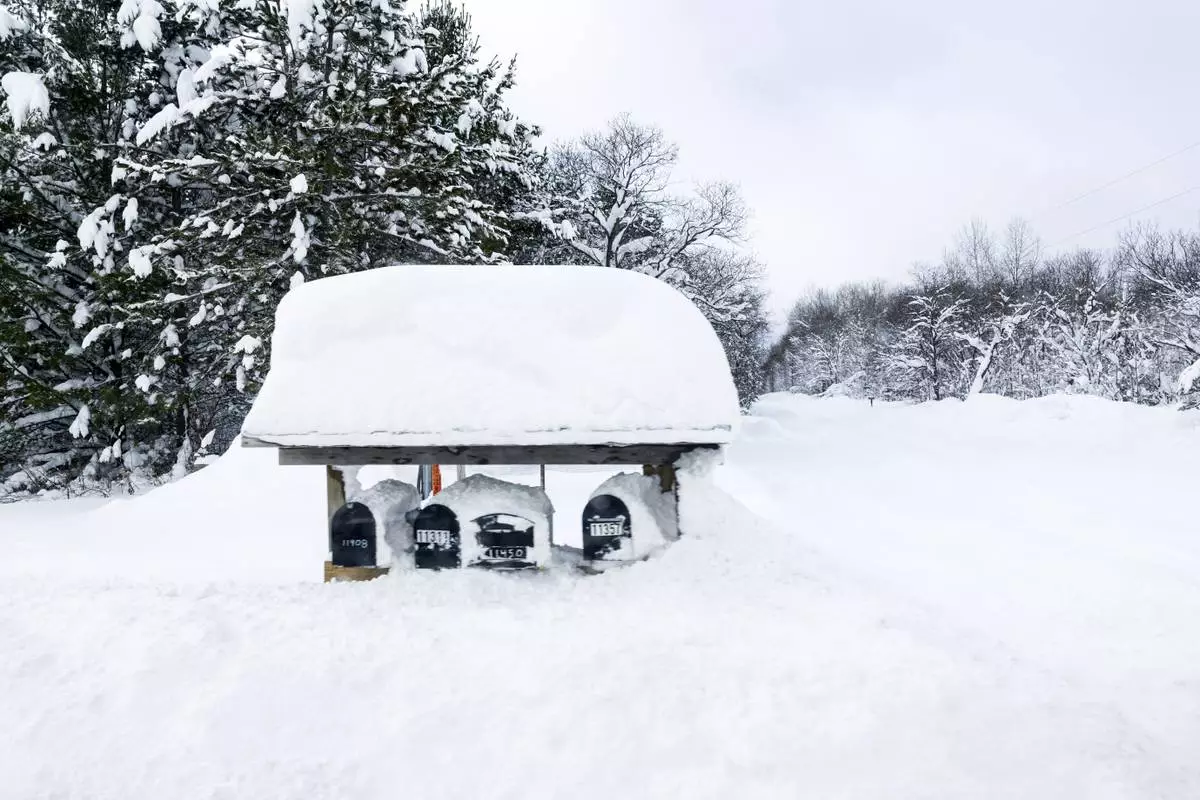
Mailboxes covered in snow in Antrim County, Mich. on Sunday, Dec. 1, 2024. (Joel Bissell/Kalamazoo Gazette via AP)
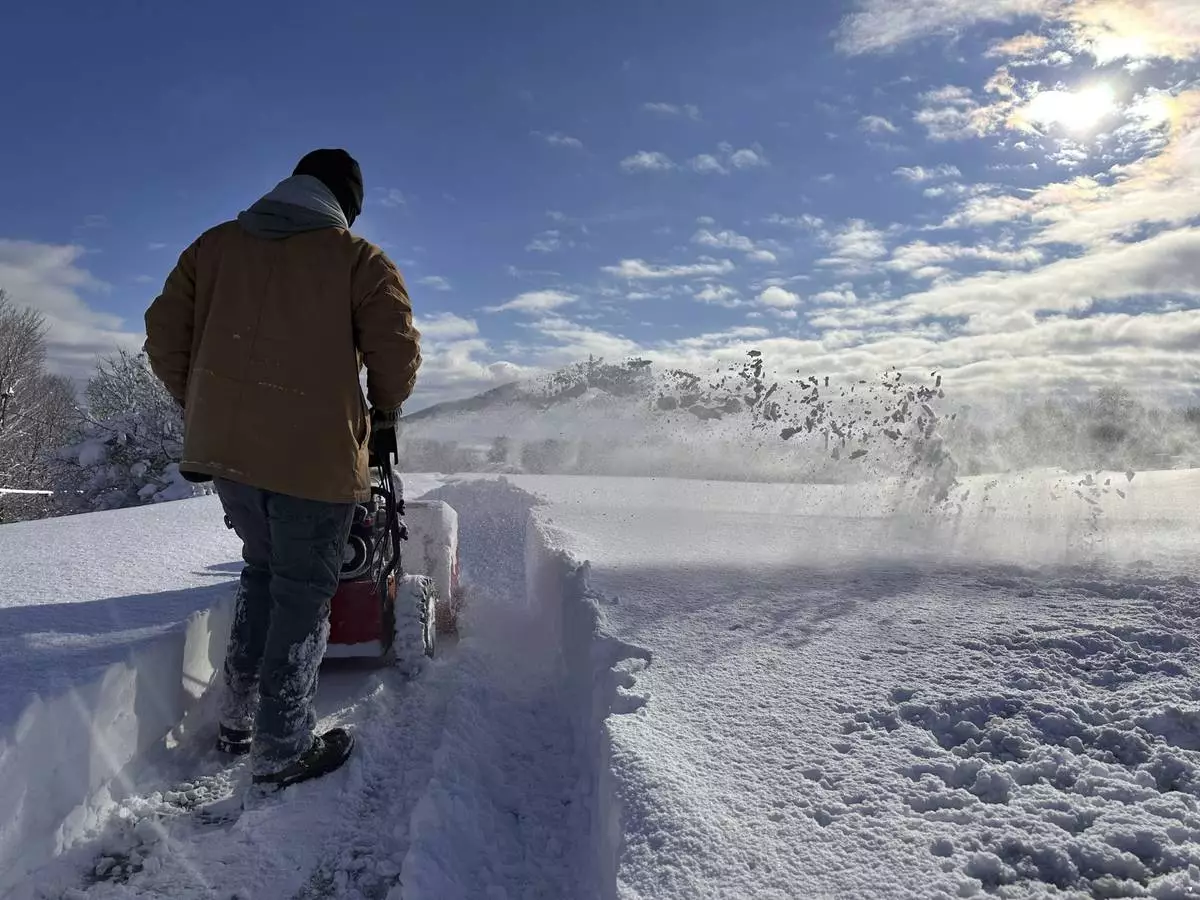
A man plows a sidewalk after a snow storm in Lowville, N.Y., Monday, Dec. 2, 2024. (AP Photo/Cara Anna)
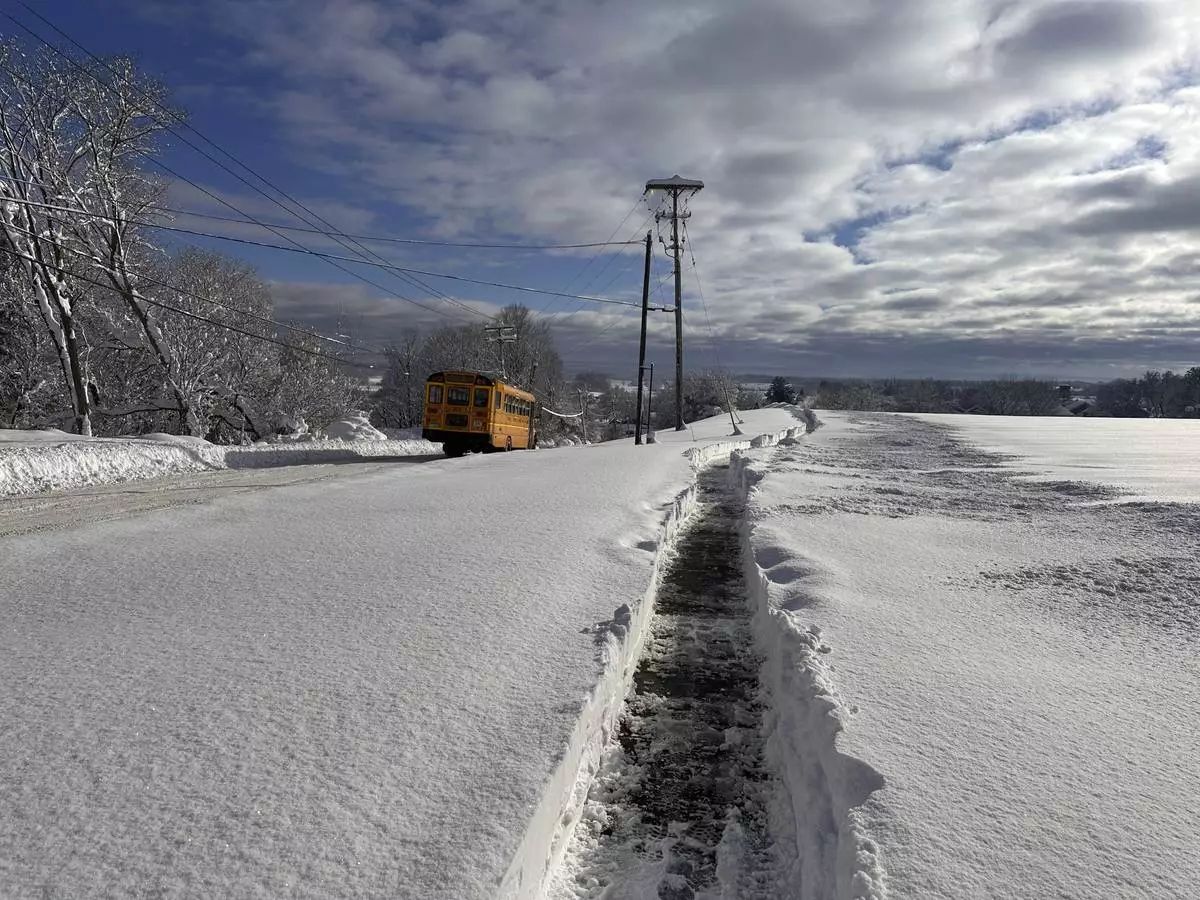
A school bus is on a delayed schedule after a snow storm in Lowville, N.Y., Monday, Dec. 2, 2024. (AP Photo/Cara Anna)
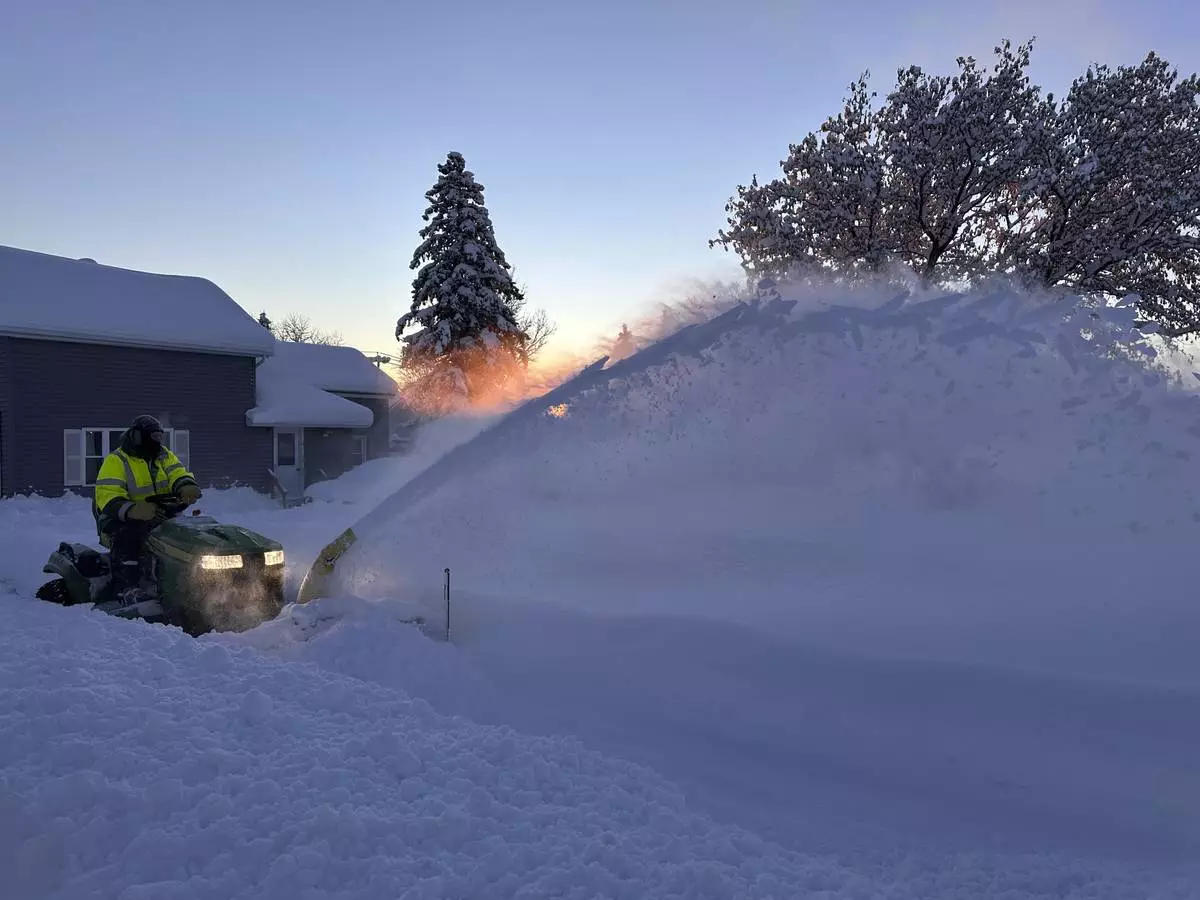
A snowplow clears snow as the sun rises in Lowville, N.Y., Monday, Dec. 2, 2024. (AP Photo/Cara Anna)
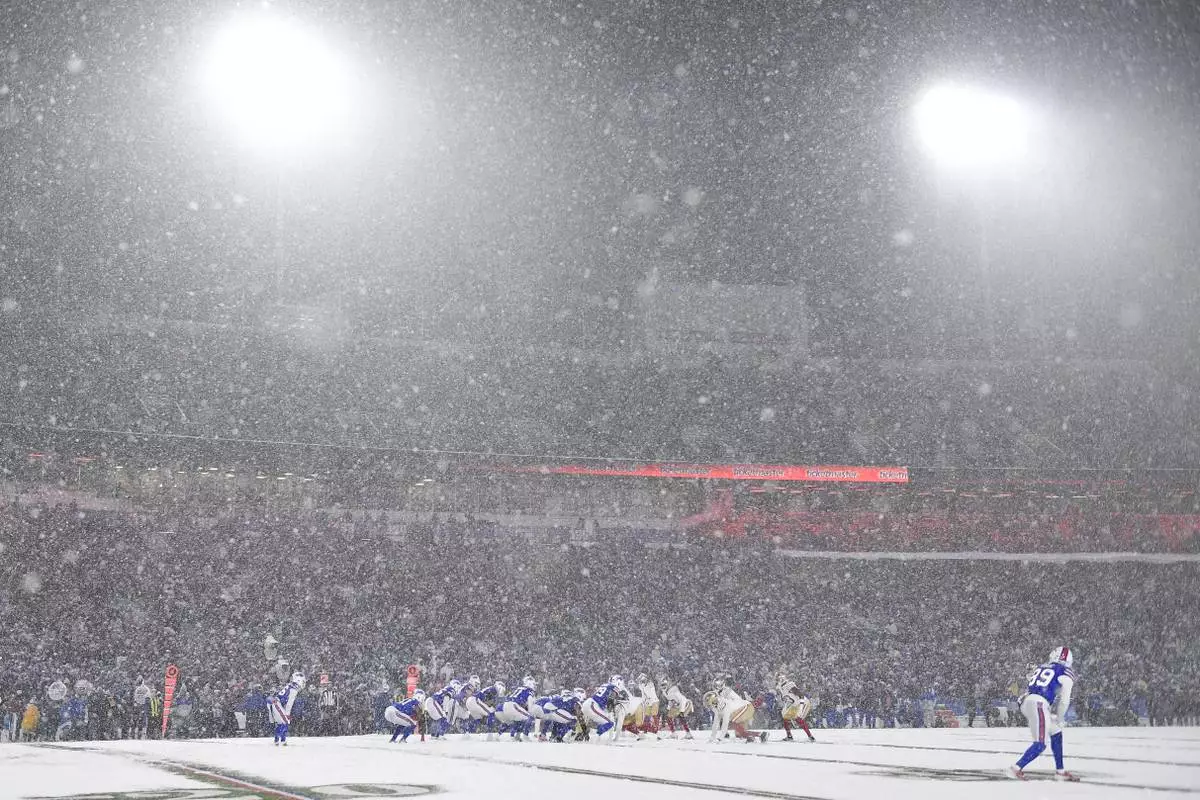
Snow falls at Highmark Stadium during the second half of an NFL football game between the Buffalo Bills and the San Francisco 49ers in Orchard Park, N.Y., Sunday, Dec. 1, 2024. (AP Photo/Adrian Kraus)
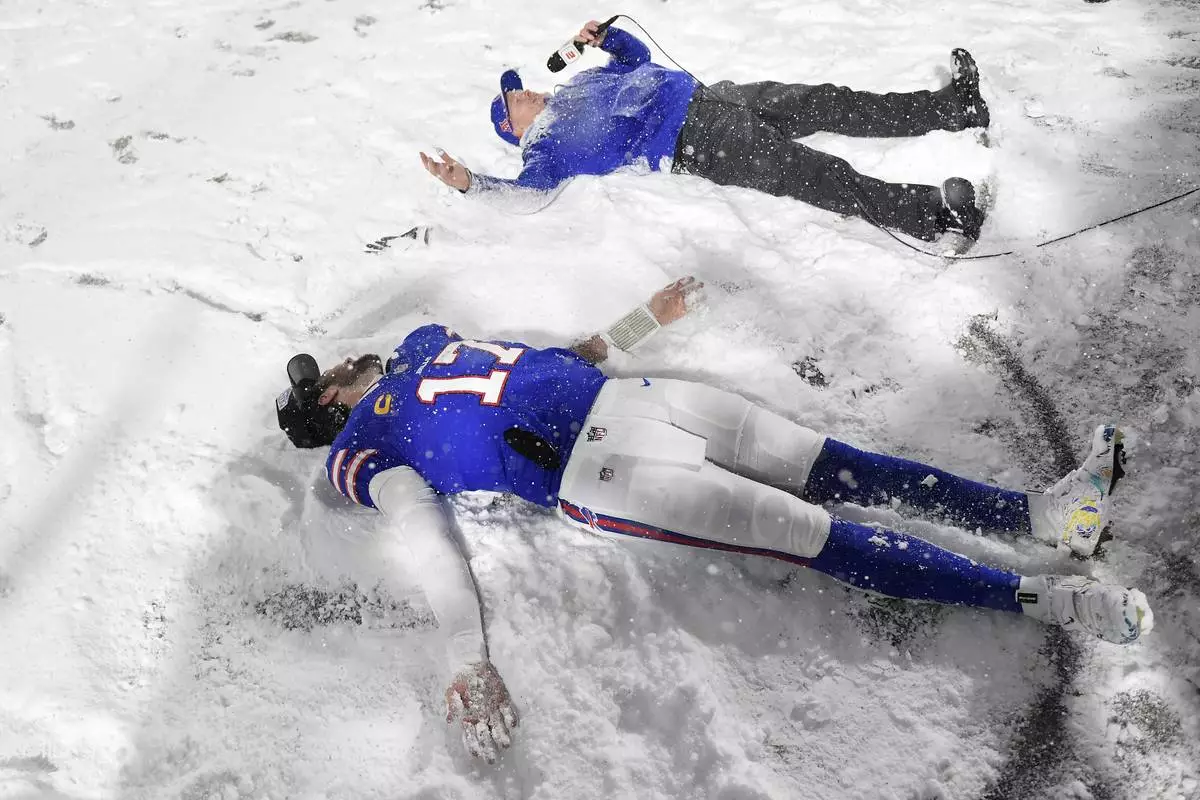
Buffalo Bills quarterback Josh Allen (17) and head coach Sean McDermott make snow angels on the field while being interviewed after an NFL football game against the San Francisco 49ers in Orchard Park, N.Y., Sunday, Dec. 1, 2024. (AP Photo/Adrian Kraus)
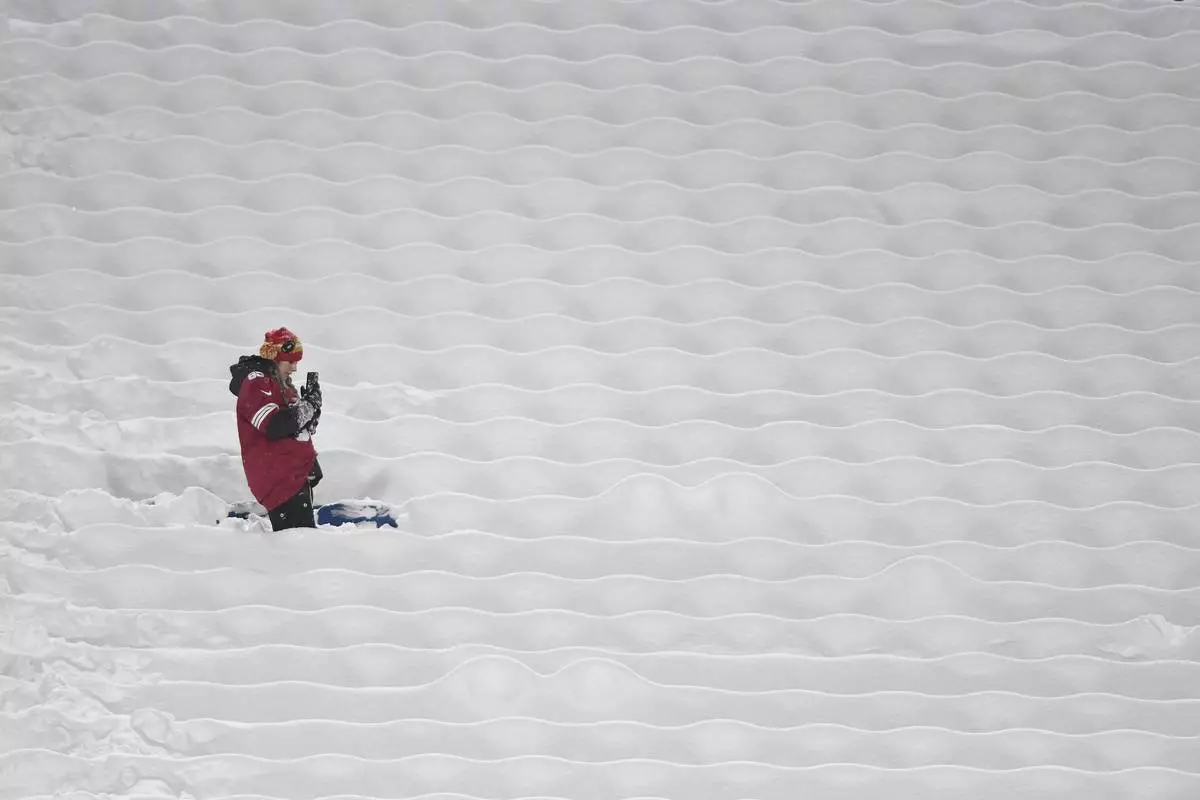
A San Francisco 49ers fan stands between snow covered seats before an NFL football game between the Buffalo Bills and the 49ers in Orchard Park, N.Y., Sunday, Dec. 1, 2024. (AP Photo/Adrian Kraus)
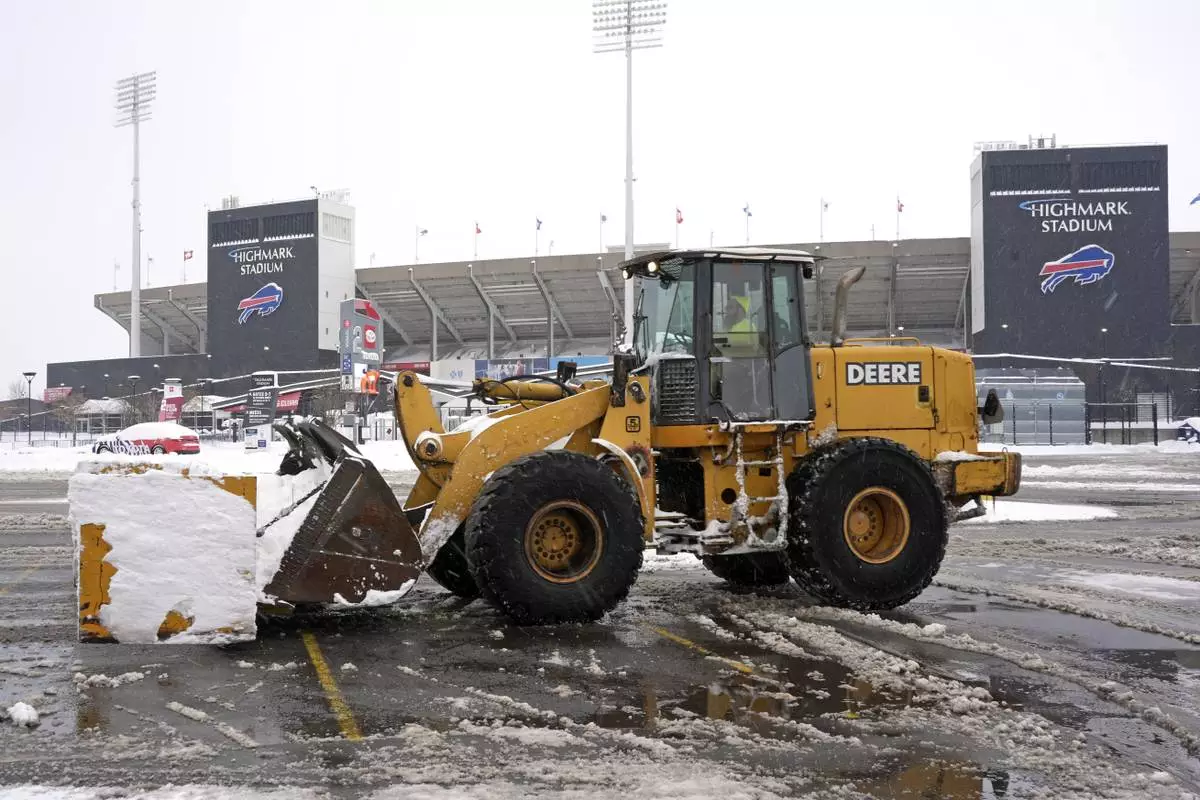
Snow is cleared from a Highmark Stadium parking lot for a Sunday Night Football game between the Buffalo Bills and the San Francisco 49ers on Sunday, Dec. 1, 2024 in Orchard Park, N.Y. (AP Photo/Gene J. Puskar)
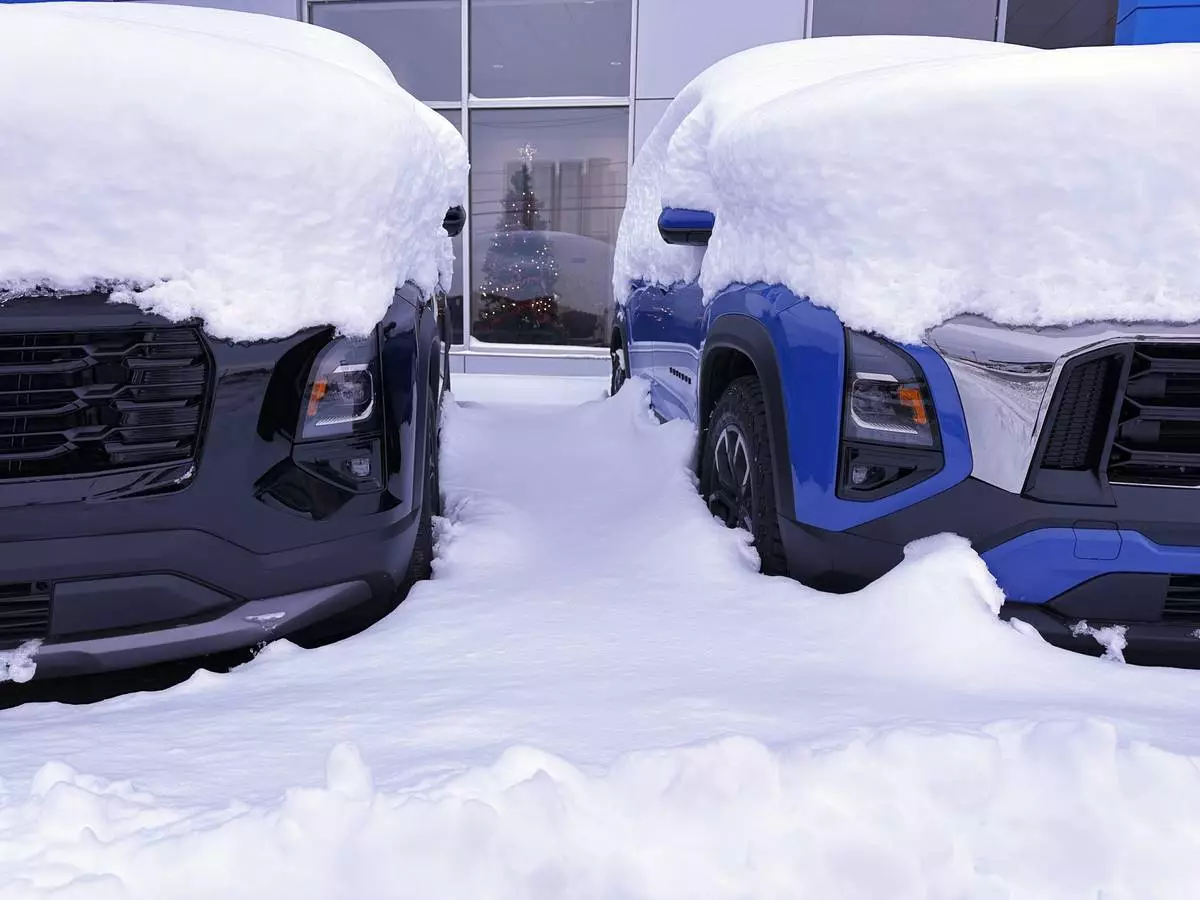
Vehicles are covered during a snow storm in Lowville, N.Y., on Sunday Dec, 1, 2024. (AP Photo/Cara Anna)
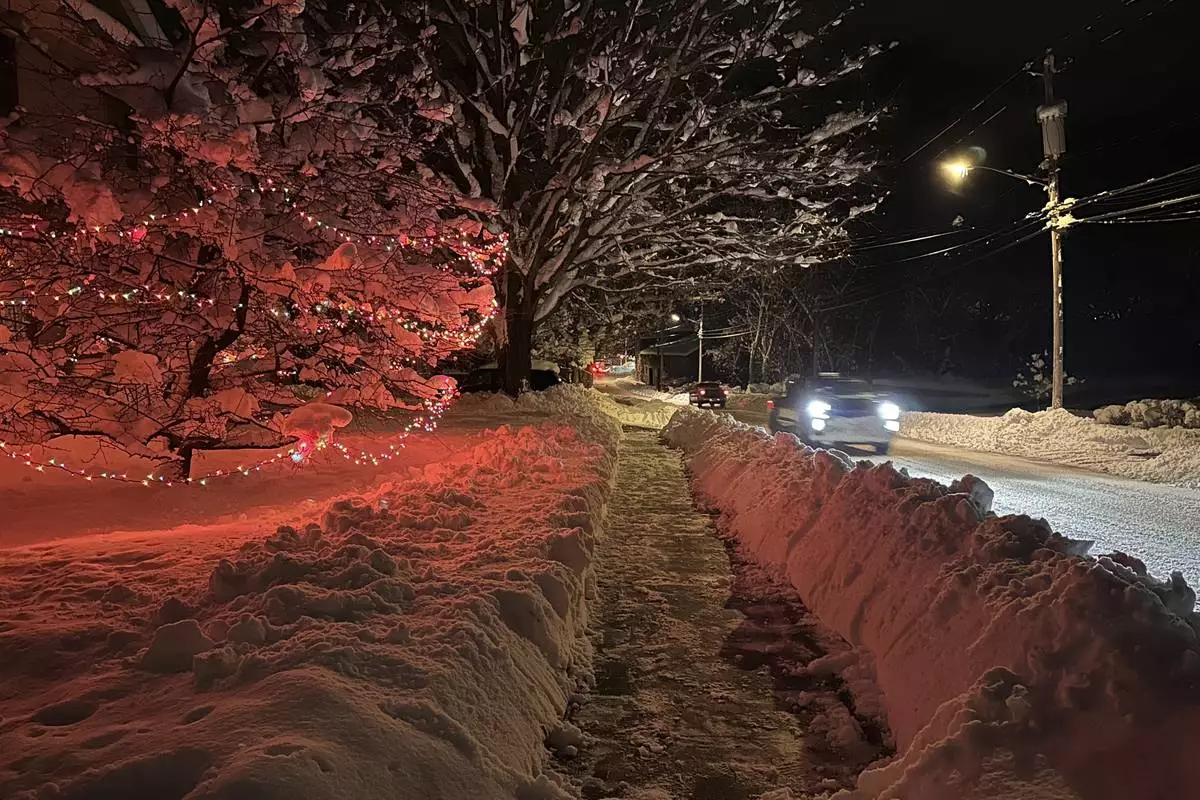
Drivers take advantage of the lull between lake-effect snowfalls in Lowville, N.Y., on Saturday, Nov. 30, 2024. (AP Photo/Cara Anna)
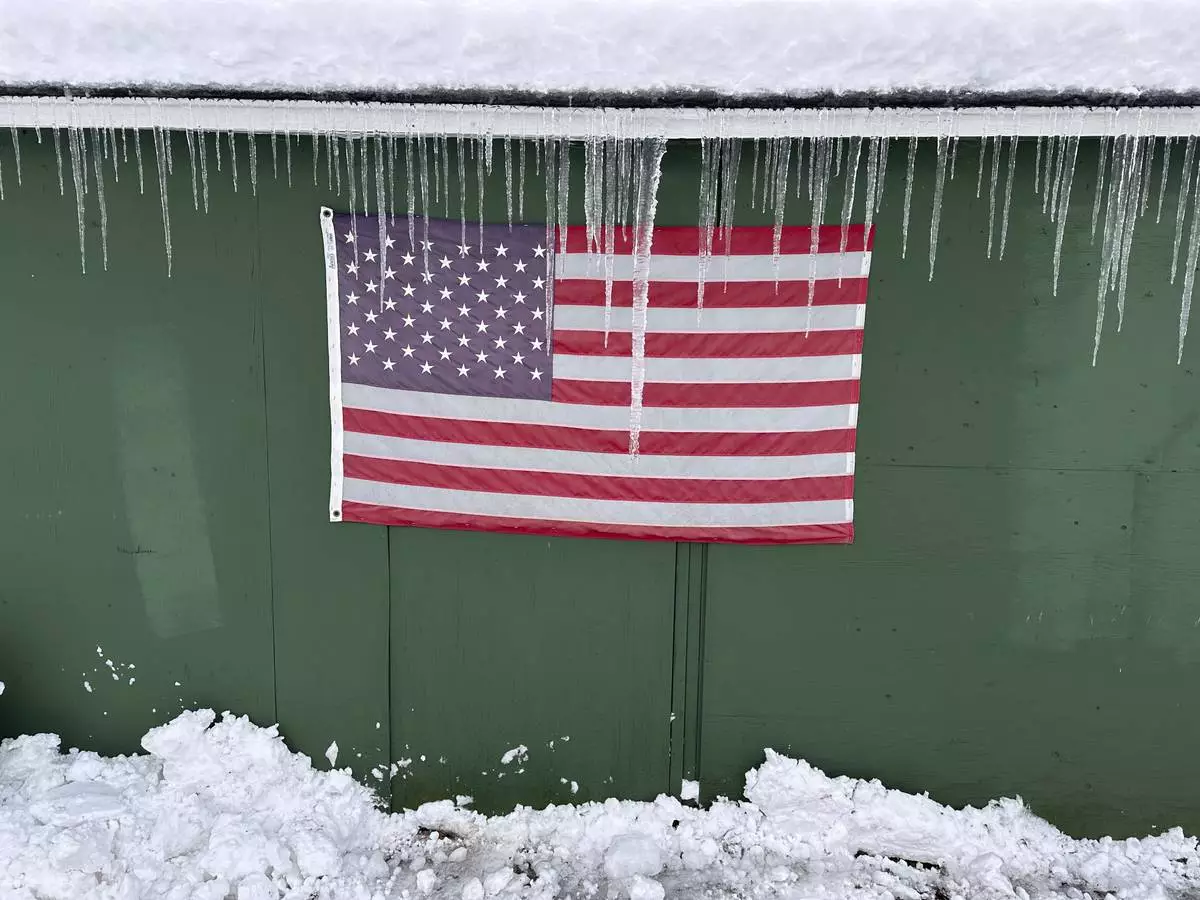
Icicles form over a flag during a snow storm, in Lowville, N.Y., on Sunday Dec, 1, 2024. (AP Photo/Cara Anna)
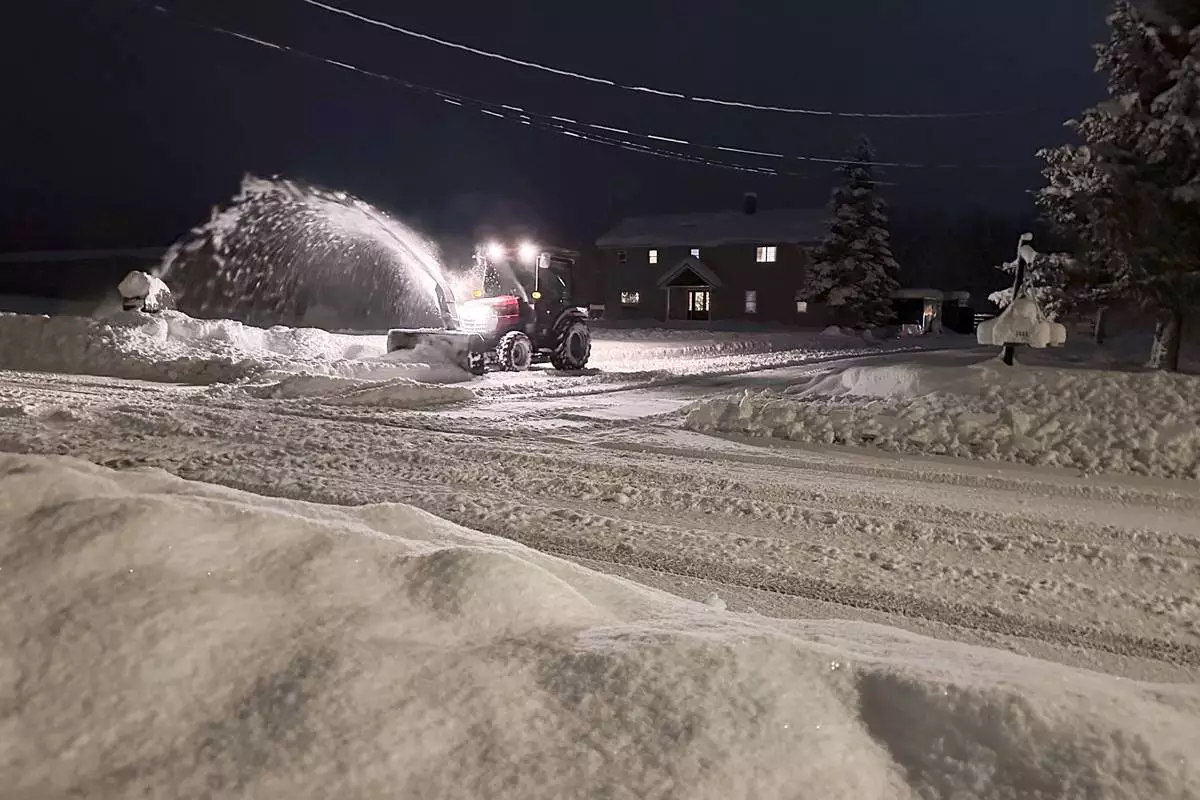
A snowplow operates in Lowville, N.Y., on Sunday, Dec. 1, 2024. (AP Photo/Cara Anna)
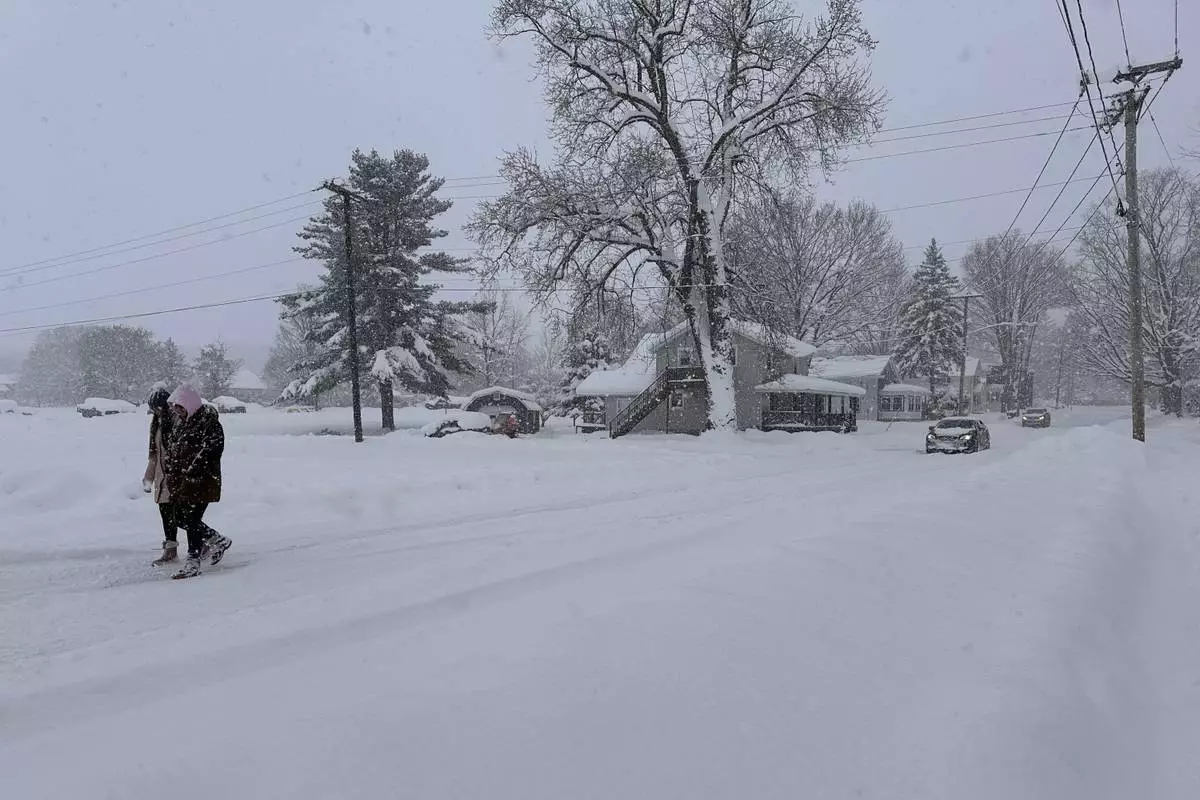
People walk in lake-effect snow on Sunday, Dec. 1, 2024, in Lowville, N.Y. (AP Photo/Cara Anna)
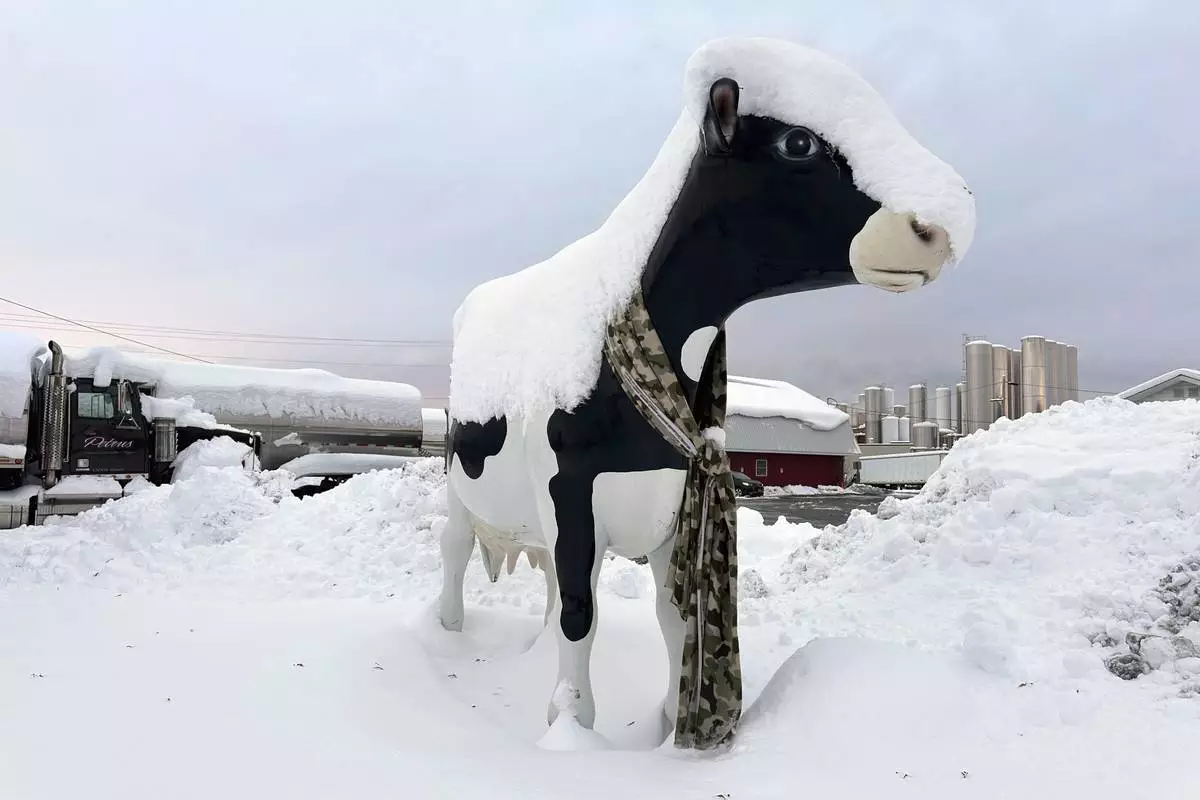
Snow rests on top of a cow sculpture in Lowville, N.Y., on Sunday Dec, 1, 2024. (AP Photo/Cara Anna)




